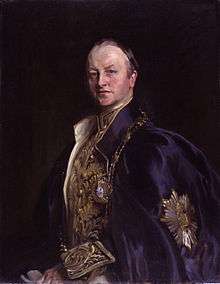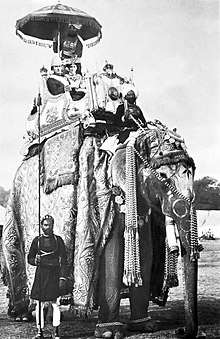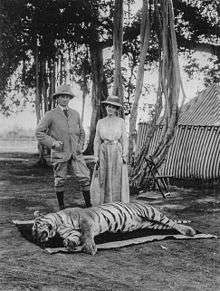
As long as we rule India, we are the greatest power in the world. If we lose it, we shall drop straight away to a third-rate Power.
George Nathaniel Curzon, 1st Marquess Curzon of Kedleston, (11 January 1859 – 20 March 1925), known as The Lord Curzon of Kedleston between 1898 and 1911 and as The Earl Curzon of Kedleston between 1911 and 1921, was a British Conservative statesman who was Viceroy of India and Foreign Secretary, but who was passed over as Prime Minister in 1923 in favour of Stanley Baldwin. The Curzon Line was named after him.
Quotes
- The miracle of the world...the biggest thing that the English are doing anywhere.
- On British rule in India, quoted in Nicholas Mansergh, The Commonwealth Experience (London: Weidenfeld and Nicolson, 1969), p. 256.
- We are ordained to walk here in the same track together for many a long day to come. You cannot do without us. We should be impotent without you. Let the Englishman and the Indian accept the consecration of a union that is so mysterious as to have in it something of the divine, and let our common ideal be a united country and a happier people.
- Speech as the Chancellor of the Calcutta University in Calcutta (15 February 1902), quoted in Lord Curzon in India, Being A Selection from His Speeches as Viceroy & Governor-General of India 1898-1905 (London: Macmillan, 1906), p. 489.
- I believe that the Durbar, more than any event in modern history, showed to the Indian people the path which, under the guidance of Providence, they are treading, taught the Indian Empire its unity, and impressed the world with its moral as well as material force. It will not be forgotten. The sound of the trumpets has already died away; the captains and the kings have departed; but the effect produced by this overwhelmingly display of unity and patriotism is still alive and will not perish. Everywhere it is known that upon the throne of the East is seated a power that has made of the sentiments, the aspirations, and the interests of 300 millions of Asiatics a living thing, and the units in that great aggregation have learned that in their incorporation lies their strength. As a disinterested spectator of the Durbar remarked, Not until to-day did I realise that the destinies of the East still lie, as they always have done, in the hollow of India’s hand. I think, too, that the Durbar taught the lesson not only of power but of duty. There was not an officer of Government there present, there was not a Ruling Prince nor a thoughtful spectator, who must not at one moment or other have felt that participation in so great a conception carried with it responsibility as well as pride, and that he owed something in return for whatever of dignity or security or opportunity the Empire had given him.
- Budget Speech (25 March 1903), quoted in Lord Curzon in India, Being A Selection from His Speeches as Viceroy & Governor-General of India 1898-1905 (London: Macmillan, 1906), pp. 308-309.

We are ordained to walk here in the same track together for many a long day to come. You cannot do without us. We should be impotent without you. Let the Englishman and the Indian accept the consecration of a union that is so mysterious as to have in it something of the divine, and let our common ideal be a united country and a happier people.
- If I had done nothing else in India I have written my name here, and the letters are a living joy.
- Letter to Mrs Curzon (4 April 1905) on his restoration of the Taj Mahal, quoted in David Gilmour, ‘Curzon, George Nathaniel, Marquess Curzon of Kedleston (1859–1925)’, Oxford Dictionary of National Biography, Oxford University Press, 2004; online edn, Jan 2011, accessed 1 Feb 2014.
- To fight for the right, to abhor the imperfect, the unjust, or the mean, to swerve neither to the right hand nor to the left, to care nothing for flattery or applause or odium or abuse—it is so easy to have any of them in India—never to let your enthusiasm be soured or your courage grow dim, but to remember that the Almighty has placed your hand on the greatest of His ploughs, in whose furrow the nations of the future are germinating and taking shape, to drive the blade a little forward in your time, and to feel that somewhere among these millions you have left a little justice or happiness or prosperity, a sense of manliness or moral dignity, a spring of patriotism, a dawn of intellectual enlightenment, or a stirring of duty, where it did not before exist—that is enough, that is the Englishman's justification in India. It is good enough for his watchword while he is here, for his epitaph when he is gone. I have worked for no other aim. Let India be my judge.
- Speech at the Byculla Club in Bombay (16 November 1905) two days before he left India, quoted in Lord Curzon in India, Being A Selection from His Speeches as Viceroy & Governor-General of India 1898-1905 (London: Macmillan, 1906), pp. 589-590.
- No one believes more firmly than we do that the safety and welfare of India depend on the permanence of British administration.
- Letter to Lord Minto (1907), quoted in Nicholas Mansergh, The Commonwealth Experience (London: Weidenfeld and Nicolson, 1969), p. 256.
- As long as we rule India, we are the greatest power in the world. If we lose it, we shall drop straight away to a third-rate Power.
- Nicholas Mansergh, The Commonwealth Experience (London: Weidenfeld and Nicolson, 1969), p. 256.
- The British people realise that they are fighting for the hegemony of the Empire. If necessary we shall continue the war single-handed.
- King Albert I of Belgium's diary entry (7 February 1916), quoted in R. van Overstraeten (ed.), The War Diaries of Albert I King of the Belgians (1954), p. 85.
- In a few weeks, or at most a few months, thanks to the skill of the Allied Commanders and the bravery of their men, the objects for which we and they have endured more than four years of sacrifice and suffering have been attained. The lands upon which the enemy had laid his cruel and predatory hand are in course of being evacuated. The exiled peoples are returning in joyous crowds across the war frontiers to their homes. The military power of the enemy is broken. His resources are spent. His armaments are in course of being surrendered. Hope breathes again in the souls of the unhappy peoples whom he has trampled in the mire. The impious spirit that claimed that Might was superior to Right and that there was no law but that of successful violence in the world has been exorcised, let us hope for ever. The conflict for international honour, righteousness, and freedom has been won, and the authors of this vast and wicked conspiracy against the liberties of mankind are fugitives on the face of the earth. My Lords, this is a great hour. It has been a wonderful victory. Are we presumptuous if we see in it the judgment of a Higher Power upon panoplied arrogance and enthroned wrong?
- Speech in the House of Lords (18 November 1918).

[Frenchmen] are not the sort of people one would go tiger-shooting with.
- We may also, I think, congratulate ourselves on the part that the British Empire has played in this struggle, and on the position which it fills at the close. Among the many miscalculations of the enemy was the profound conviction, not only that we had a "contemptible little Army," but that we were a doomed and decadent nation. The trident was to be struck from our palsied grasp, the Empire was to crumble at the first shock; a nation dedicated, as we used to be told, to pleasure-taking and the pursuit of wealth was to be deprived of the place to which it had ceased to have any right, and was to be reduced to the level of a second-class, or perhaps even of a third-class Power. It is not for us in the hour of victory to boast that these predictions have been falsified; but, at least, we may say this—that the British Flag never flew over a more powerful or a more united Empire than now; Britons never had better cause to look the world in the face; never did our voice count for more in the councils of the nations, or in determining the future destinies of mankind. That that voice may be raised in the times that now lie before us in the interests of order and liberty, that that power may be wielded to secure a settlement that shall last, that that Flag may be a token of justice to others as well as of pride to ourselves, is our united hope and prayer.
- Speech in the House of Lords (18 November 1918).
- [Frenchmen] are not the sort of people one would go tiger-shooting with.
- Leonard Mosley, Curzon: The End of an Epoch (London: Longmans, 1960), p. 210.
- Obstinate, tiresome and stupid.
- Curzon's opinion of Canadian Prime Minister William Lyon Mackenzie King, quoted in Nicholas Mansergh, The Commonwealth Experience (London: Weidenfeld and Nicolson, 1969), p. 224.
- Powerful empires existed and flourished here (in India) while Englishmen were still wandering, painted, in the woods, and while the British Colonies were still a wilderness and a jungle. India has left a deeper mark upon the history, the philosophy, and the religion of mankind, than any other terrestrial unit in the universe.
About Curzon
- My name is George Nathaniel Curzon,
I am a most superior person.
My cheek is pink, my hair is sleek,
I dine at Blenheim once a week.- Written when Curzon was at Oxford, the first couplet was probably written by J. W. Mackail; the second couplet probably by Cecil Spring-Rice.
- [Quoting Curzon:] "All civilization has been the work of aristocracies." It would be much more true to say "The upkeep of aristocracies has been the hard work of all civilizations."
- Winston Churchill, The People's Rights [1909] (London: Jonathan Cape, 1970), p. 54.
- No one had ever challenged unpopularity among his own people so fearlessly as [Curzon] did in his endeavours... to secure even justice for Indians against Europeans.
- Ignatius Valentine Chirol to Lord Hardinge (12 May 1915), quoted in David Gilmour, ‘Curzon, George Nathaniel, Marquess Curzon of Kedleston (1859–1925)’, Oxford Dictionary of National Biography, Oxford University Press, 2004; online edn, Jan 2011, accessed 1 Feb 2014.
- Curzon is an intolerable person to do business with—pompous, dictatorial and outrageously conceited.... Really he is an intolerable person, pig-headed, pompous and vindictive too! Yet an able, strong man with it all.
- Maurice Hankey's diary entry (12 May 1916), quoted in Stephen Roskill, Hankey, Man of Secrets: Volume I 1877-1919 (London: Collins, 1970), pp. 271-272.
- Whether in India or here at home, from first to last through a long and strenuous career, he set... and he followed, the highest possible standard of duty, of tireless and devoted industry.... A great and unselfish servant of the State, who, in that service, was always ready to "scorn delights and live laborious days," a man who pursued high ambitions by none but worthy means, who never sulked under the rebuffs of fortune, who never allowed himself to be soured by the disappointment of unrealised hopes, he takes an assured place in the long line of those who have enriched by their gifts and dignified by their character the annals of English public life.
- Lord Oxford and Asquith in the House of Lords (23 March 1925).
- Thirty-five years ago he and I were young men in London, with different outlooks, with different social surroundings, with different ideas about our careers, but an intimacy sprung up which was never checked.... Three things distinguished him then, as they did later: unflinching courage, a wide devotion to the State which always looked beyond himself, and an unshakable resolution when he had made up his mind. With these qualities Lord Curzon went to India as Viceroy. It is not necessary to agree about everything in his policy in order to appreciate how great an administrator Lord Curzon was there.... I know, not by his testimony but by the testimony of others, that by his courage and his determination to see justice done he redressed many an individual evil and put right much that a man of less energy and tenacity of purpose than himself could not have put right.... He was a man in a high sense of the word.... We shall look back upon his figure, we shall look back upon it as a figure which was that of a great Englishman, and we shall look back upon that figure with pride in our race.
- Lord Haldane in the House of Lords (23 March 1925).
- The symbol of Empire in its noon-tide splendour.
- Nicholas Mansergh, The Commonwealth Experience (London: Weidenfeld and Nicolson, 1969), p. 5.
- The very epitome of snobbishness and embodiment of the exclusive hereditary principle.
- A. D. Harvey, Collision of Empires. Britain in Three World Wars, 1793-1945 (London: Phoenix, 1994), p. 460.
- He was likewise determined to prevent famine from being used as a cause for reform. With hunger spreading on an unprecedented scale through two-thirds of the subcontinent, he ordered his officials to publicly attribute the crisis strictly to drought. When an incautious member of the Legislative Council in Calcutta, Donald Smeaton, raised the problem of over-taxation, he was (in Boer War parlance) prompdy "Stellenboshed." Although Curzons own appetite for viceregal pomp and circumstance was notorious, he lectured starving villagers that "any Government which imperilled the financial position of India in the interests of prodigal philanthropy would be open to serious criticism; but any Government which by indiscriminate alms-giving weakened the fibre and demoralised the self-reliance of the population, would be guilty of a public crime."
- Davis, Mike. Late Victorian Holocausts. 1. Verso, 2000. ISBN 1-85984-739-0 pg 162
External links


This article is issued from
Wikiquote.
The text is licensed under Creative
Commons - Attribution - Sharealike.
Additional terms may apply for the media files.